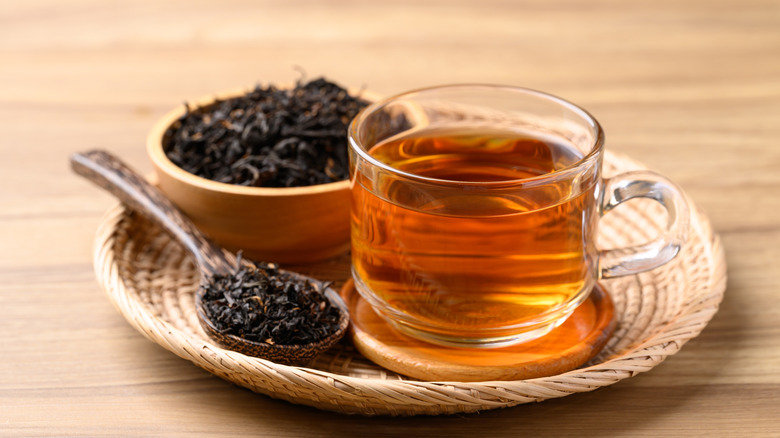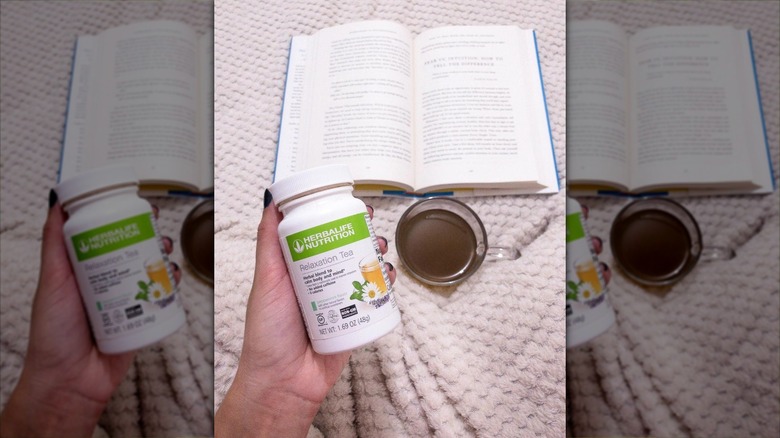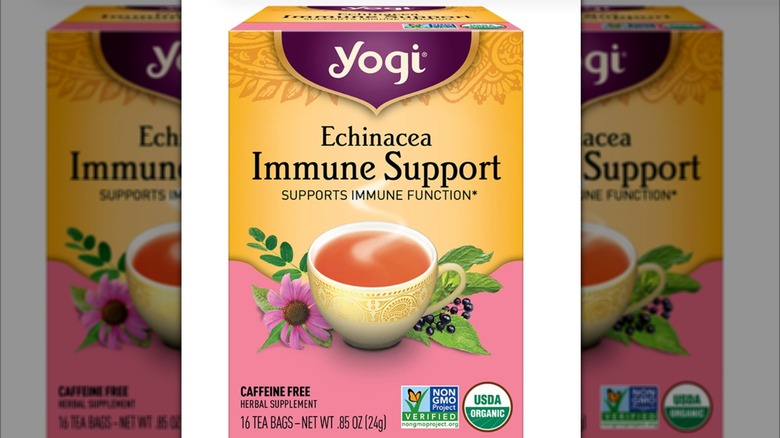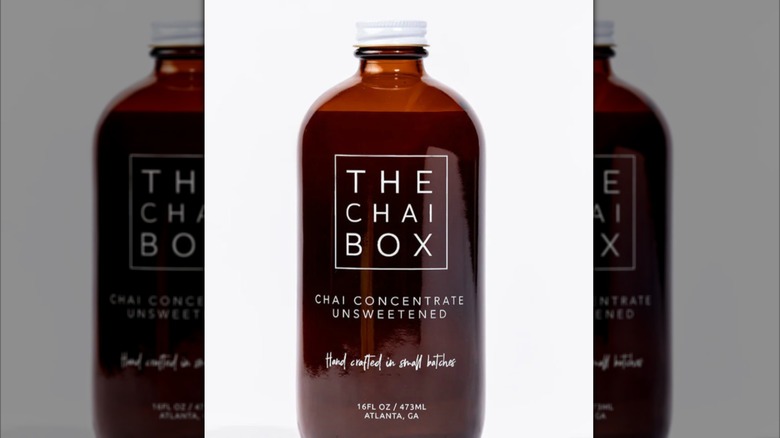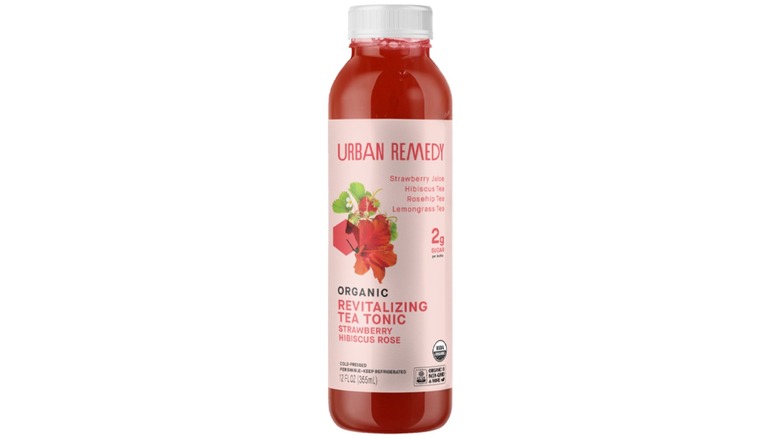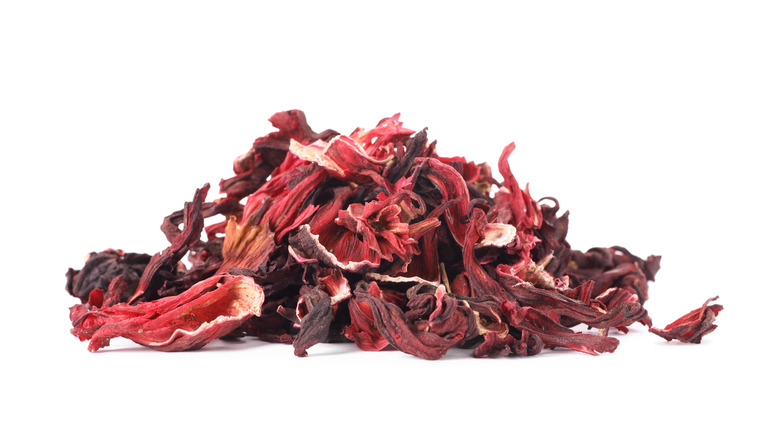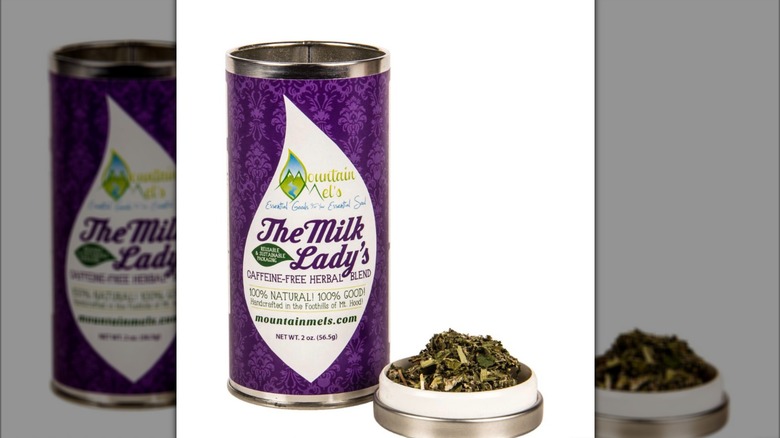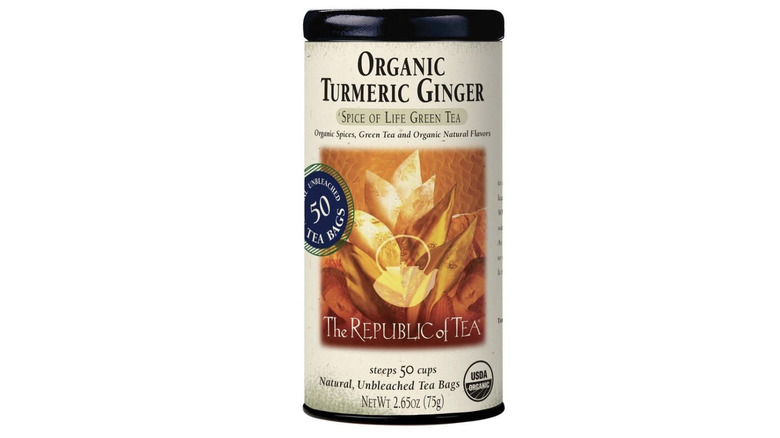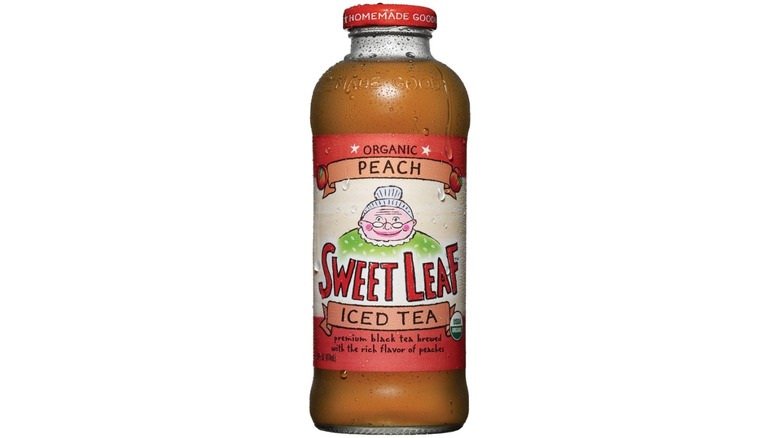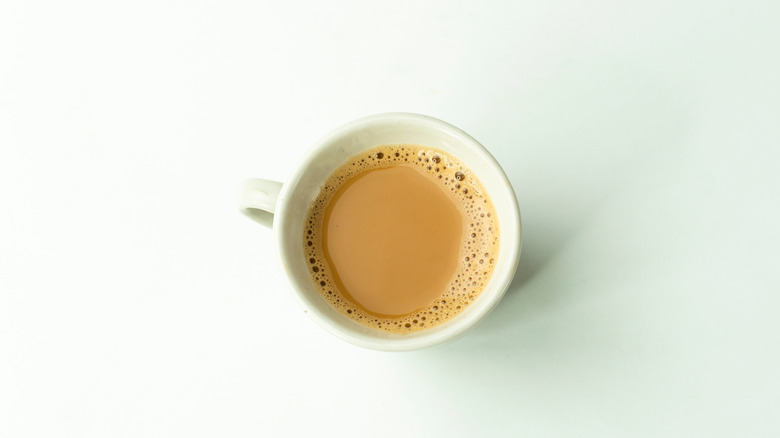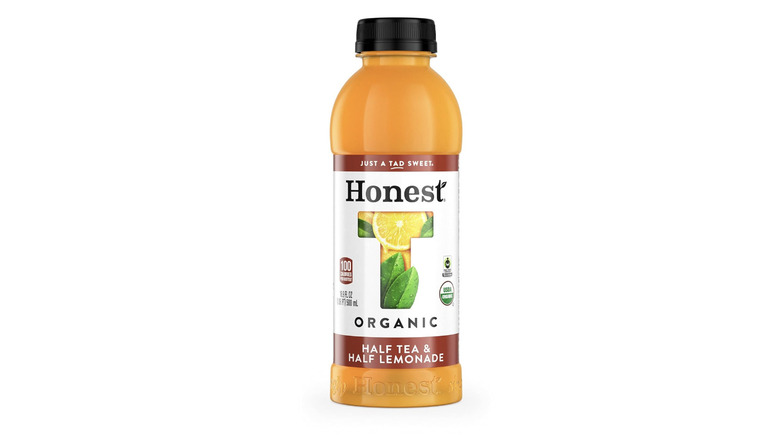Tea Recalls That Affected Millions
We may receive a commission on purchases made from links.
Few pleasures are as simple and comforting as a steaming cup of tea on a winter's day. The ritual of sipping a quality brew isn't just warming, but also offers a much-needed pause from the chaos of everyday life. Whether it's black, green, or oolong, each type of tea has its own distinct flavor and health benefits. Beyond warm brews, today's supermarket shelves are also lined with refreshing iced teas, perfect for those craving a tea fix on a hot day.
Despite its many benefits, tea comes with several cautionary tales. Over the years, the tea industry has experienced its share of safety scares. From pesticide contamination to undeclared allergens, these recalls remind us that even a product as seemingly harmless as tea can harbor hidden health risks. Ready to find out more about some of the biggest tea recalls in U.S. history? Check out these major tea safety alerts that led to widespread product withdrawals.
Herbalife International of America recalls Herbalife Nutrition Relaxation Tea due to incorrect ingredient use (2025)
When a recall takes place, companies normally name the exact contaminant or unlabeled ingredient involved. However, this wasn't the case when Herbalife International of America recalled Herbalife Nutrition Relaxation Tea in July 2025. The tea is formulated to calm the body and mind, and typically contains lemon balm, passionflower, lavender, and chamomile, plus stevia as a sweetener, peppermint and spearmint extract, and maltodextrin. However, according to the FDA, the product was pulled from the shelves because it was manufactured using an incorrect ingredient that came from a supplier.
Herbalife International of America recalled nearly 6,000 units of the relaxation tea, which had been sold online nationwide, as well as in Mexico and Ecuador. Each canister of the product contained 60 servings of tea. To emphasize the level of risk involved, the FDA gave the Herbalife Nutrition Relaxation Tea recall a Class II designation, which applies to "a situation in which use of or exposure to a violative product may cause temporary or medically reversible adverse health consequences or where the probability of serious adverse health consequences is remote."
East West Tea Company recalls Yogi Echinacea Immune Support tea due to pesticide residue (2024)
East West Tea Company's Yogi brand maintains organic standards. However, in 2024, the company's processes were called into question when the FDA discovered traces of pesticides in its Yogi Echinacea Immune Support tea. It was suspected that the pesticide drifted from neighboring farms, contaminating the harvest of echinacea. Not only did the levels of pesticide fall short of East West Tea Company's high standards, but they were also higher than the FDA's established actionable levels.
In total, the East West Tea Company pulled 54,846 boxes, equating to around 877,536 tea bags, from supermarket shelves. The FDA gave the recall a Class III designation, the lowest possible rating applied to "a situation in which use of or exposure to a violative product is not likely to cause adverse health consequences." In response to the contamination, the East West Tea Company started sourcing its echinacea from another supplier. The company also started working with its partners to ensure adherence to all testing protocols.
WS Global recalls Himalayan Pain Relief Tea due to the presence of prescription drugs (2023)
While pain relief tea may sound like a great natural remedy for those pesky aches and pains, WS Global's Himalayan Pain Relief Tea proved to be at odds with its wholesome marketing when the company issued a nationwide recall of the product in 2023. Upon testing the product, the FDA found that it contained two very unexpected ingredients: diclofenac and dexamethasone.
Diclofenac is a nonsteroidal anti-inflammatory drug, which can heighten the risk of cardiovascular events, while dexamethasone is a corticosteroid used to manage inflammation-related conditions. Both drugs come with a list of side effects and could interfere with other medications. As such, it's important that they are prescribed by a medical practitioner and not casually consumed in tea. Highlighting the relative seriousness of the recall, the FDA gave it a Class II rating, meaning that the product could cause short-term or reversible health issues but posed a low likelihood of severe illness. Luckily, no adverse health effects were reported at the time of the recall.
The Chai Box recalls Chai Concentrate Mix and Chai Concentrate Unsweetened Mix due to suspected Clostridium botulinum contamination (2022)
Originating in India, chai blends black tea, spices, and milk. To make preparing the brew easier, The Chai Box offers chai concentrates — a base of Assam tea and spices, ready for mixing with dairy or plant-based milk. In 2022, the company made headlines after announcing a recall of its 16-ounce glass bottles and 64-ounce plastic bottles of Chai Concentrate Mix and Unsweetened Chai Concentrate Mix due to possible contamination with Clostridium botulinum.
While the exact details of the manufacturing blunder weren't publicized, The Chai Box pulled the tea concentrate off the market after discovering that the product could have been under-processed. Any inadequate processing can lead to contamination with Clostridium botulinum, a bacterium that can cause botulism. Potentially deadly, the condition manifests through symptoms like nausea, vomiting, stomach cramps, difficulty swallowing or speaking, and blurred or double vision. No illnesses were linked to the products at the time of the recall.
Urban Remedy recalls Organic Revitalizing Tea Tonic Strawberry Hibiscus Rose after Hepatitis A outbreak (2022)
In 2022, multiple states in the U.S. experienced an outbreak of hepatitis A. In total, at least 17 people were infected with the virus in three states, with 13 cases severe enough to require hospitalization. At least 10 people were also sickened in Canada. The health scare was linked to fresh strawberries imported from Baja California, Mexico. The tainted strawberries were sold under two brands — FreshKampo and HEB — between March 5 and April 15, 2022.
Afraid of potential contamination, Urban Remedy promptly removed its Organic Revitalizing Tea Tonic Strawberry Hibiscus Rose from grocery stores. The 12-ounce plastic bottles of the tea were sold in 24 states. While hepatitis A varies in severity, even mild cases of the infection can last several weeks. Symptoms of the infection include fever, fatigue, nausea, vomiting, diarrhea, abdominal pain, and jaundice. In the most severe cases, hepatitis A can progress to liver failure and even death.
Mojave Foods Corporation recalls El Guapo Jamaica Hibiscus Flower pouches due to undeclared allergen (2018)
One of the most common reasons for food recalls involves food allergens that haven't been disclosed on the label. Even trace amounts of undeclared ingredients can trigger life-threatening reactions such as anaphylaxis in sensitive individuals. In 2018, this type of labeling oversight was precisely why Mojave Foods Corporation recalled its El Guapo Jamaica Hibiscus Flower pouches.
Mojave Foods Corporation initiated a recall of four sizes of El Guapo Jamaica Hibiscus Flower — which is used to make hibiscus tea — after discovering that the product contained undeclared peanuts. Listed alongside milk, soybeans, eggs, fish, shellfish, tree nuts, wheat, and sesame as one of the FDA's nine major allergens, peanuts pose a serious risk to consumers allergic to the ingredient. The hibiscus tea had been distributed to grocery stores in Alabama, Arizona, California, Colorado, Florida, Georgia, Idaho, Oregon, New Mexico, Nevada, Tennessee, Texas, and Utah, which resulted in a far-reaching recall.
Mountain Mel's Essential Goods recalls The Milk Lady tea blends due to potential salmonella contamination (2019)
When it comes to product safety, one tainted ingredient can spoil the entire batch. This is exactly what happened in 2019, when Mountain Mel's Essential Goods pulled several of its tea blends from supermarket shelves due to fennel seeds that were potentially contaminated with salmonella. The three teas in question included The Milk Lady's Herbal Tea Blend, Peaceful Baby Herbal Tea Blend, and Diges-Teas Herbal Tea Blend. The contaminated products were sold at New Seasons Markets in Oregon and Washington, and across the country through Azure Standard, the Mountain Mel's website, and Amazon.
Salmonella is a foodborne pathogen that can cause serious illness. It can cause fever, diarrhea, nausea, and vomiting, while at-risk groups may experience more severe symptoms. The elderly, young children, and consumers with compromised immune systems are particularly at risk, as they may develop arterial infection, endocarditis, and reactive arthritis. In the most serious cases, salmonella can result in death.
The Republic of Tea recalls Organic Turmeric Ginger tea due to possible salmonella contamination (2016)
Turmeric and ginger are a popular combo in the world of natural wellness products. Both ingredients are used in traditional medicine to improve digestion and reduce inflammation, serve as a home stomachache remedy, and support overall health. Unfortunately, in 2016, those benefits were overshadowed by a recall when the Republic of Tea had to pull its Organic Turmeric Ginger tea from grocery store shelves due to concerns over salmonella contamination.
Following the typical cascade of food safety notifications, the Republic of Tea recalled the product after its organic ginger supplier warned of possible contamination — a warning that the supplier had, in turn, received from another company. Despite not finding any salmonella in the product during its own testing, the Republic of Tea recalled the tea as a preventative measure. Todd B. Rubin, minister of evolution at The Republic of Tea, explained the decision to recall the product to CNN, saying, "We are taking this preventive, cautious measure because we want our citizens to feel comfortable when drinking our premium quality teas and herbs."
Nestlé Waters North America recalls Sweet Leaf Tea bottles over fears of glass contamination (2015)
Established in 1998, Sweet Leaf Tea produced a range of flavored teas, naturally sweetened with pure cane sugar. In 2011, the company was acquired by Nestlé Waters North America, which had already invested in the brand in 2009. The move marked Nestlé's expansion into the ready-to-drink beverage segment of iced teas, lemonades, and juices.
Just four years after acquiring the company, Nestlé Waters North America pulled 1.5 million glass bottles of Sweet Leaf Tea Company flavored tea from supermarket shelves due to possible contamination with glass fragments. More specifically, the recall involved six tea flavors, including original, raspberry, green tea with citrus, peach, mint and honey, and half-and-half lemonade tea.
While Nestlé received four complaints (two from consumers and two from distributors) who found glass in their bottles of tea, no injuries were reported at the time of the recall. The company explained that the problem was traced back to a bottle that broke during the filling phase of production at its Pennsylvania facility and claimed that it would enforce stricter observation of this process moving forward.
Harmony Chai recalls chai tea due to concerns over Clostridium botulinum contamination (2013)
Clostridium botulinum is a bacterium that can survive in improperly processed food. It thrives in sealed, low-oxygen environments, creating botulinum toxin. When ingested, this harmful toxin can cause botulism, a serious illness that can lead to vomiting, trouble swallowing and speaking, and even death. In 2013, Harmony Chai recalled its Concentrated Black Spiced Chai and Decaffeinated Rooibos Chai due to improper processing that could have created the conditions for a Clostridium botulinum contamination.
While we are short on details, the tea products were pulled from supermarket shelves after the Washington State Department of Agriculture found that the processing method used to manufacture the products didn't ensure protection against Clostridium botulinum. The Washington-based company sold the chai tea through grocery stores, cafes, and farmers' markets. Fortunately, no illnesses were connected to the products at the time it was pulled from the shelves.
Honest Tea recalls bottled iced tea due to possible contamination with glass fragments (2003)
Many recalls are triggered when foreign matter, such as plastic, glass, or metal, is found in food items. This was highlighted in 2003, when Honest Tea recalled its bottled iced tea due to possible contamination with glass shards. This was five years after the company was founded as a start-up in a Maryland kitchen. The recall hit Honest Tea hard since the company had yet to make a profit, making the blunder a threat not just to consumers but also to the company's future. The FDA gave the recall a Class II designation, indicating that exposure to the product could have caused reversible problems, though it was unlikely to result in long-lasting issues or prove fatal.
While no consumers reported being hurt by the glass shards at the time of the recall, the potential for injury was great, as explained by the company's co-founder, Seth Goldman, in an interview on the podcast "How I Built This." "There were a lot of blisters in the glass," he said (via CNBC). "Literally, you could look at it and see little bubbles. And so we ran it on the production line, and the way the line works is that if [it] sees a defect in the bottle, it is supposed to kick it out, reject the bottle. But the line didn't do that." While the brand survived the financial blow, it was acquired in 2011 by Coca-Cola, which then discontinued Honest Tea in 2022.
